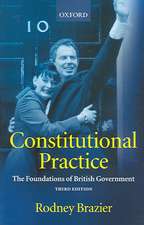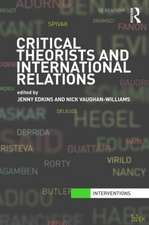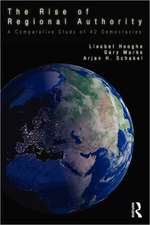Sedition and the Advocacy of Violence: Free Speech and Counter-Terrorism
Autor Sarah Sorialen Limba Engleză Paperback – 15 apr 2013
This approach will shed new light on the problems of the sedition laws and how they might be remedied by providing a conceptual account of the nature of speech and its relation to action. On the basis of J.L Austin’s account of verdictive and exercitive speech acts, it is argued that while all speech acts are ‘conduct’ in a narrow sense, not all of them have the power to produce effects. This philosophical account will have legal consequences for how we classify speech acts deemed to be dangerous, or to cause harm. It also suggests that because speech can evoke or constitute action or conduct in certain circumstances, modern versions of sedition laws might in principle be defensible, but not in their current form. On the basis of this account, it is argued that the harms caused or constituted by speech can be located in the authority of the speaker.
Sedition and Violence Against the State: Free Speech and Counter-Terrorism will be of interest to students and scholars of philosophy of law and legal theory.
| Toate formatele și edițiile | Preț | Express |
|---|---|---|
| Paperback (1) | 296.68 lei 6-8 săpt. | |
| Taylor & Francis – 15 apr 2013 | 296.68 lei 6-8 săpt. | |
| Hardback (1) | 1053.95 lei 6-8 săpt. | |
| Taylor & Francis – 22 sep 2011 | 1053.95 lei 6-8 săpt. |
Preț: 296.68 lei
Preț vechi: 347.68 lei
-15% Nou
Puncte Express: 445
Preț estimativ în valută:
56.77€ • 61.86$ • 47.84£
56.77€ • 61.86$ • 47.84£
Carte tipărită la comandă
Livrare economică 23 aprilie-07 mai
Preluare comenzi: 021 569.72.76
Specificații
ISBN-13: 9780415859769
ISBN-10: 041585976X
Pagini: 216
Dimensiuni: 156 x 234 x 13 mm
Greutate: 0.32 kg
Ediția:1
Editura: Taylor & Francis
Colecția Routledge
Locul publicării:Oxford, United Kingdom
ISBN-10: 041585976X
Pagini: 216
Dimensiuni: 156 x 234 x 13 mm
Greutate: 0.32 kg
Ediția:1
Editura: Taylor & Francis
Colecția Routledge
Locul publicării:Oxford, United Kingdom
Public țintă
Postgraduate and UndergraduateCuprins
Introduction 1. Modern Sedition Law and the ‘Glorification’ of Terrorism: A Legislative Overview 2. Free Speech and Democracy: The problem of ‘line-drawing’ 3. Can Saying So Make it So: The relation between speech and action 4. Speech and Harm 5. Truth, Autonomy, and the Marketplace of Ideas 6. Imitation, belief formation and media technologies 7. Policy Implications 8. Conclusion
Recenzii
"This study addresses the complexities of free speech when it's extreme — in chapters giving a legislative overview, the problem of "line-drawing," the relation between speech and action and between speech and harm, truth and the "marketplace" of ideas, belief formation and media technologies, and policy implications. Sorial is affiliated with the U. of Wollongong, Australia. Her work will be of interest to students and scholars of philosophy of law and legal theory."—Book News
Descriere
Sedition refers to the uttering or writing of words intended to bring the sovereign state into hatred or contempt, to urge disaffection against the Constitution or democratically elected government, or the attempt to procure change in government by unlawful means. Modern sedition laws, such as those enacted in Australia, the United Kingdom, the United States and The Council of Europe target types of speech advocating violence against the state, in the form of religious sermons preaching violent jihad or glorifying acts of terrorism, although they have the potential to cover much more than this. For this reason, the modernisation of sedition laws renewed debate about the status of free speech and religious expression in a time of so-called terror.
This book will look at the issue of sedition by providing an explanatorily account of the relation between speech and action using speech act theory as developed by J.L. Austin and applying this to the task of developing a defence of freedom of speech as a qualified right. This book contributes to the debate over the contested status of freedom of speech that sedition laws give rise to by filling in the explanatory gaps in our current understanding of the value of free speech as a qualified right. It provides arguments that go beyond the traditional parameters of the debate by exploring, in significant detail, the ways in which speech is also conduct, the ways in which it can harm the social interest, and why, for these reasons, sedition might be defensible, but also suggest ways in which their scope could be limited to ensure that such laws are not open to abuse.
This book will look at the issue of sedition by providing an explanatorily account of the relation between speech and action using speech act theory as developed by J.L. Austin and applying this to the task of developing a defence of freedom of speech as a qualified right. This book contributes to the debate over the contested status of freedom of speech that sedition laws give rise to by filling in the explanatory gaps in our current understanding of the value of free speech as a qualified right. It provides arguments that go beyond the traditional parameters of the debate by exploring, in significant detail, the ways in which speech is also conduct, the ways in which it can harm the social interest, and why, for these reasons, sedition might be defensible, but also suggest ways in which their scope could be limited to ensure that such laws are not open to abuse.












